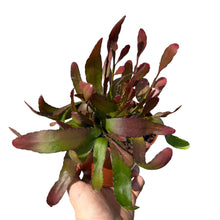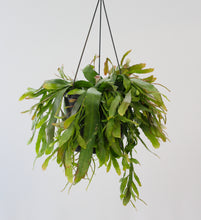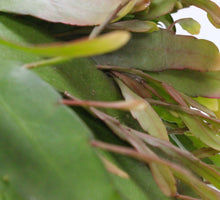Pseudorhipsalis ramulosa is part of the Cactaceae family and its native range is Central & S. Mexico to S. Tropical America, Jamaica. This epiphytic cactus grows in tropical forests, it produces flat modified stems with a scalloped edge and can reach up to 1m long. It’s strap-like foliage turns a striking red colour when exposed to a lot of light.
Genus name means false wicker work, this is in reference to the branches. Specific epithet comes from the Latin ramulosus, meaning branched.
Pot: ø 12cm.
Foliage: Approximately 15cm in length.
Light: Bright indirect light, meaning the plant sees the sun for 0-4 hours per day - this could be through trees or a translucent curtain, it’s important for the plant to see the sky in order to thrive. In its natural environment this plant would receive dappled light.
Water: With adequate light and a well draining potting mix, allow the top two inches to dry out before watering.
Potting mix: A well draining mix composed of a small amount of coco coir, perlite or vermiculite, orchid bark, horticultural grit and worm castings; you could also add some horticultural charcoal to this epiphytic mix.
Fertilising: Feed your plant with a cactus fertiliser every few waterings during the growing season or when you observe active growth. You can dilute fertiliser to half the recommended amount but never add more.
Temperature: 18-24˚C.
Humidity: Pseudorhipsalis would prefer higher humidity but do well to adapt to average home humidity. You can increase humidity by placing the plant on a watered pebble tray or using a humidifier.
Pseudorhipsalis ramulosa are non-toxic.





